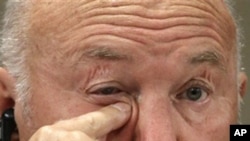After being fired by Russia's president, Moscow Mayor Yuri Luzhkov has decided he is not leaving gracefully.
After 18 years as Moscow's mayor, Yuri Luzhkov slammed the door on his way out of City Hall.
After Luzhkov was fired Tuesday by Russian President Dmitry Medvedev, he has released a letter calling the president a Stalinist.
In the letter, Luzhkov charged the Kremlin is suppressing dissent and leading the nation "to a situation where there is just one leader in the country whose words are written in granite, and who must be followed unquestioningly."
The chairman of the ruling United Russia Party, Boris Gryzlov, told reporters Luzhkov had been suffering from delusions of grandeur, thinking of himself as 'Master of Moscow.'
Luhkov's friends say he will fight his dismissal with a lawsuit and join opposition politics. But his comments are not expected to win converts with Russia's democratic opposition.
During his years as mayor, Luhkov curbed press freedom with libel cases against journalists and politicians, and curbed freedom of assembly by authorizing police to break up demonstrations and arrest protesters.
Veteran Moscow political analyst Chris Weafer dismisses Luzhkov's moves as 'theatrics" and predicts Kremlin officials will offer him a deal like this.
"'We will leave you alone, and we will not investigate you or your wife's business, provided that you also cooperate with us.' My sense is that the mayor is most unlikely to go into any opposition role," said Chris Weafer. "He is most unlikely to want to split United Russia or to cause any political disruption. And I think the greatest likelihood is that he will resurface with some prominent job."
Responding to the sudden end of the Luzhkov era the leader of the Solidarity opposition movement, Boris Nemtsov, called for federal prosecutors to investigate corruption allegations against Moscow City Hall.
Left-wing leader Sergei Udaltsov called for prosecutors to check all building sites for corruption.
The historic preservation movement, Arkhnadzor, called for a moratorium on the demolition of all buildings in Moscow's historic core.
In another development, Moscow's Deputy Mayor Alexander Ryabinin resigned. Last May, he had been charged with accepting a bribe. Mayor Luzhkov had stood by him.
Despite the political turmoil, no large scale inquiries have been launched. In separate press statements, spokesmen for the Federal Prosecutor's office and the Interior Ministry's Economic Security Department said no new investigations are underway into alleged Luzhkov-era corruption at Moscow's City Hall.
Acting Mayor Vladimir Resin, a veteran bureaucrat, gave a Soviet-style report on the city that left television viewers with little hope he would make any major changes until the Kremlin appoints a new mayor, presumably within one month.
Moscow's Fired Mayor Slams Door on Leaving City Hall
- By James Brooke




